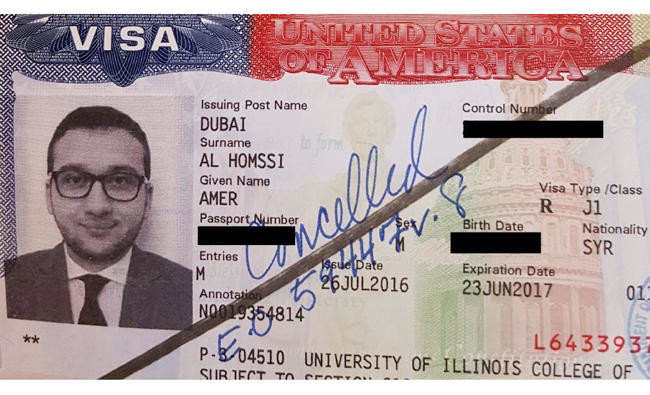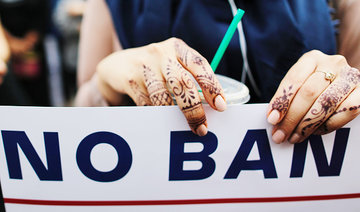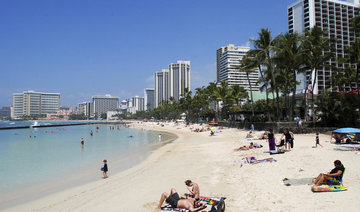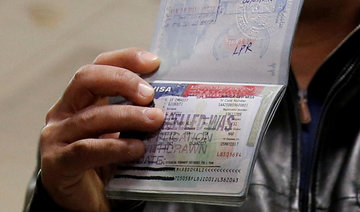BALTIMORE: A coalition of Muslim and Iranian-American advocates and a nonpartisan legal institute filed the first lawsuits against the Trump administration’s new travel restrictions for citizens of eight countries, including Iran, that were announced late last month.
The lawsuits were filed Monday in federal courts in New York and Maryland.
The Trump administration in September announced the most recent restrictions, which affect citizens of Chad, Iran, Libya, North Korea, Somalia, Syria, and Yemen — and some Venezuelan government officials and their families. They are to go into effect Oct. 18.
One lawsuit, filed Monday night in US District Court for the Southern District of Maryland on behalf of the Iranian Alliance Across Borders and six individuals, argues that restricting travel for citizens of predominantly Muslim countries violates the US Constitution.
“Iranian Americans, and other affected communities, have had to familiarize themselves with ambiguous new laws and policies every few months because of this president’s obsession with fulfilling a flawed campaign promise to ban Muslims from the United States. This erosion of fundamental American values must stop,” said Shayan Modarres, legal counsel for the National Iranian American Council, one of the groups that filed the lawsuit.
A second suit, filed hours earlier in the US District Court for the Southern District of New York on behalf of the Brennan Center for Justice at New York University, seeks to compel the State Department to comply with a Freedom of Information Act request and turn over documents submitted to the White House by the Department of Homeland Security detailing the information-sharing practices of foreign countries and justifying the decision to exclude travelers from select countries.
The US Department of Justice did not immediately respond to a request for comment Monday. The White House referred questions to the State Department, which declined to comment on ongoing litigation.
President Donald Trump on Sept. 24 issued a proclamation outlining the new travel restrictions. Administration officials said the latest version is the result of a lengthy process, based on an objective assessment of each country’s security situation and willingness to share information with the US
It was the administration’s third measure to limit travel after a broad ban that sparked chaos at US airports in January and numerous challenges in courts across the country. The administration later issued a temporary order after suffering legal setbacks on the earlier attempt at restrictions.
The Iranian Alliance Across Borders lawsuit is filed against Trump, acting Secretary of Homeland Security Elaine Duke, acting Commissioner of US Customs and Border Protection Kevin McAleenan, acting Director of US Citizenship and Immigration Services James McCament, Attorney General Jeff Sessions and Secretary of State Rex Tillerson.
The suit argues that simply adding two countries that are not majority-Muslim to the list is only “an effort to disguise the Proclamation’s targeting of Muslims.” Such discrimination violates the First Amendment and the Immigration and Nationality Act, the suit says. The group is asking for a nationwide injunction to stop the restrictions from going into effect.
“Despite President Trump’s attempts to cloak this latest iteration of his Muslim ban in religiously neutral garb by invoking a national security review and including North Korea and Venezuela, the purpose and effect of the Proclamation remain unchanged: to keep Muslims from entering the United States.”
The prior ban included Sudan but didn’t include Chad, North Korea or Venezuela. The new measures range from an indefinite ban on visas for citizens of Syria to more targeted limitations. Iranians, for example, will not be eligible for immigrant, tourism or business visas but remain eligible for student and cultural exchange visas if they undergo additional scrutiny.
Johnathan Smith, legal director for Muslim Advocates, an organization representing the plaintiffs in both lawsuits, said the complaints take issue with both the impact of the travel restrictions and the process by which they were developed.
“You can’t ignore the fact that this ban affects heavily Muslim countries, and the fact that they attempt to obscure that bias by adding two countries — North Korea and Venezuela — that don’t have a Muslim majority doesn’t negate the fact that at its core, this policy is about blocking entry of Muslim individuals into the United States,” Smith said. “In addition to the challenge of constitutionality to the program, it’s equally important to bring some transparency, some light, some sunshine to these processes so all Americans can see what’s happening and make their own judgments and assessments about what the White House and federal agencies are doing.”
The American Civil Liberties Union (ACLU) and other groups previously sued the administration over its original travel ban on visitors from six majority-Muslim countries. Last week, the ACLU announced that it planned to amend its existing lawsuit to include the latest restrictions, and seek to stop the suspension of visas and other entry restrictions. Justice Department spokesman Ian Prior said in an e-mail Friday that the agency “will continue to vigorously defend the President’s inherent authority to keep this country safe.”


Travel ban lawsuits filed by legal center, Muslim advocates
Travel ban lawsuits filed by legal center, Muslim advocates

Uganda army denies seizing opposition leader as vote result looms
KAMPALA: Uganda’s army denied claims on Saturday that opposition leader Bobi Wine had been abducted from his home, as counting continued in an election marred by reports of at least 10 deaths amid an Internet blackout.
President Yoweri Museveni, 81, looked set to be declared winner and extend his 40-year rule later on Saturday, with a commanding lead against Wine, a former singer turned politician.
Wine said Friday that he was under house arrest, and his party later wrote on X that he had been “forcibly taken” by an army helicopter from his compound.
The army denied that claim.
“The rumors of his so-called arrest are baseless and unfounded,” army spokesman Chris Magezi told AFP.
“They are designed to incite his supporters into acts of violence,” he added.
AFP journalists said the situation was calm outside Wine’s residence early Saturday, but they were unable to contact members of the party due to continued communications interruptions.
A nearby stall-owner, 29-year-old Prince Jerard, said he heard a drone and helicopter at the home the previous night, with a heavy security presence.
“Many people have left (the area),” he said. “We have a lot of fear.”
With more than 80 percent of votes counted on Friday, Museveni was leading on 73.7 percent to Wine’s 22.7, the Electoral Commission said.
Final results were due around 1300 GMT on Saturday.
Wine, 43, whose real name is Robert Kyagulanyi, has emerged as the main challenger to Museveni in recent years, styling himself the “ghetto president” after the slum areas where he grew up in the capital, Kampala.
He has accused the government of “massive ballot stuffing” and attacking several of his party officials under cover of the Internet blackout, which was imposed ahead of Thursday’s polls and remained in place on Saturday.
His claims could not be independently verified, but the United Nations rights office said last week that the elections were taking place in an environment marked by “widespread repression and intimidation” against the opposition.
- Reports of violence -
Analysts have long viewed the election as a formality.
Museveni, a former guerrilla fighter who seized power in 1986, has total control over the state and security apparatus, and has ruthlessly crushed any challenger during his rule.
Election day was marred by significant technical problems after biometric machines — used to confirm voters’ identities — malfunctioned and ballot papers were undelivered for several hours in many areas.
There were reports of violence against the opposition in other parts of the country.
Muwanga Kivumbi, member of parliament for Wine’s party in the Butambala area of central Uganda, told AFP’s Nairobi office by phone that security forces had killed 10 of his campaign agents after storming his home.
President Yoweri Museveni, 81, looked set to be declared winner and extend his 40-year rule later on Saturday, with a commanding lead against Wine, a former singer turned politician.
Wine said Friday that he was under house arrest, and his party later wrote on X that he had been “forcibly taken” by an army helicopter from his compound.
The army denied that claim.
“The rumors of his so-called arrest are baseless and unfounded,” army spokesman Chris Magezi told AFP.
“They are designed to incite his supporters into acts of violence,” he added.
AFP journalists said the situation was calm outside Wine’s residence early Saturday, but they were unable to contact members of the party due to continued communications interruptions.
A nearby stall-owner, 29-year-old Prince Jerard, said he heard a drone and helicopter at the home the previous night, with a heavy security presence.
“Many people have left (the area),” he said. “We have a lot of fear.”
With more than 80 percent of votes counted on Friday, Museveni was leading on 73.7 percent to Wine’s 22.7, the Electoral Commission said.
Final results were due around 1300 GMT on Saturday.
Wine, 43, whose real name is Robert Kyagulanyi, has emerged as the main challenger to Museveni in recent years, styling himself the “ghetto president” after the slum areas where he grew up in the capital, Kampala.
He has accused the government of “massive ballot stuffing” and attacking several of his party officials under cover of the Internet blackout, which was imposed ahead of Thursday’s polls and remained in place on Saturday.
His claims could not be independently verified, but the United Nations rights office said last week that the elections were taking place in an environment marked by “widespread repression and intimidation” against the opposition.
- Reports of violence -
Analysts have long viewed the election as a formality.
Museveni, a former guerrilla fighter who seized power in 1986, has total control over the state and security apparatus, and has ruthlessly crushed any challenger during his rule.
Election day was marred by significant technical problems after biometric machines — used to confirm voters’ identities — malfunctioned and ballot papers were undelivered for several hours in many areas.
There were reports of violence against the opposition in other parts of the country.
Muwanga Kivumbi, member of parliament for Wine’s party in the Butambala area of central Uganda, told AFP’s Nairobi office by phone that security forces had killed 10 of his campaign agents after storming his home.
© 2026 SAUDI RESEARCH & PUBLISHING COMPANY, All Rights Reserved And subject to Terms of Use Agreement.












